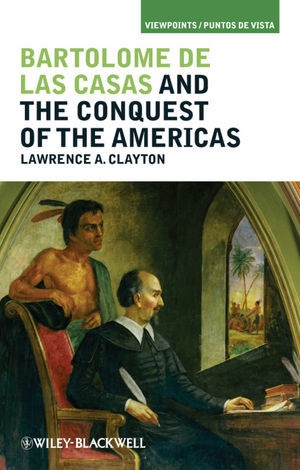Read more
Informationen zum Autor Lawrence A. Clayton is Professor and Interim Chair of the Department of History at the University of Alabama. His books include A History of Modern Latin America, second edition (2004), Peru and the United States: The Condor and the Eagle (1999), and The De Soto Chronicles (editor, 1993). He is currently writing the first major biography of Las Casas in more than a generation. Klappentext After Christopher Columbus, Bartolomé de las Casas is the single most important figure in the period known as the Encounter, a time of intensive conflict between Europeans and the people of the Americas following Columbus's voyages. In this book, Clayton provides a short history of the age of exploration and the conquest of the Americas told through the experience and acts of Las Casas. Las Casas, a Dominican friar, witnessed the brutality of the Spanish explorers early in the conquest. Motivated above all by Christian scripture, he turned on the conquistadors with a passion that made him the most prominent defender and protector of the native peoples of the Americas. He led a lifelong crusade to secure justice for Amerindians within a Christian framework of justice and equality. Through Las Casas's story, Clayton explores the major events and conflicts of the period, including the relationship between colonizers and colonized and the burgeoning trade in African slaves. The book allows readers to enter the world of the Encounter through the eyes of an individual who not only lived through the period, but was crucial in forming it. In doing so, it provides a foundation for understanding the early days of Spanish exploration, settlement, and conquest, a period which set the stage for the creation of the modern civilization of the Americas. Zusammenfassung After Christopher Columbus, Bartolome de las Casas is the single most important figure in the period of the Encounter, a time of conflict between Europeans and the people of the Americas following Columbus's voyages. Here Clayton provides a history of the age as told through the life of Las Casas. Inhaltsverzeichnis List of Illustrations Series Editor's Preface Acknowledgments Timeline Introduction 1. The Era of Columbus and the "Discoverers" Modern interpretations Conquest of La Española 2. Justice for All Discovering his calling Father Montesinos' sermon Las Casas goes to Cuba To Spain Meeting Ferdinand 3. Social Experiments: The Hieronymite Mission and the Universal Protector of All the Indians 4. The Era of the Conquests of Mexico and Peru, 1520s-1540s Seville, autumn, 1520 The conquest of Mexico 5. The New Laws of 1542 and Bishop of Chiapa Laying the groundwork Bishop of Chiapa 6. "All Mankind is One": On the Nature of Humans, Servitude, and Slavery Bartolomé de las Casas and the African slave trade Conclusion Notes Bibliographic Essay Index ...
List of contents
List of Illustrations
Series Editor's Preface
Acknowledgments
Timeline
Introduction
1. The Era of Columbus and the "Discoverers"
Modern interpretations
Conquest of La Española
2. Justice for All
Discovering his calling
Father Montesinos' sermon
Las Casas goes to Cuba
To Spain
Meeting Ferdinand
3. Social Experiments: The Hieronymite Mission and the Universal Protector of All the Indians
4. The Era of the Conquests of Mexico and Peru, 1520s-1540s
Seville, autumn, 1520
The conquest of Mexico
5. The New Laws of 1542 and Bishop of Chiapa
Laying the groundwork
Bishop of Chiapa
6. "All Mankind is One": On the Nature of Humans, Servitude, and Slavery
Bartolomé de las Casas and the African slave trade
Conclusion
Notes
Bibliographic Essay
Index
Report
"Beside my students, I would recommend this book to anyone with a desire to understand better what is one of the most compelling periods in history." ( The Journal of Latin American Studies , 1 April 2013)
"Clayton (Univ. of Alabama) has written an excellent, concise survey of the life and work of Bartolome de las Casas, the Dominican friar who advocated fiercely on behalf of indigenous Americans during the 16th-century Spanish conquest of the America. . .Recommended. Lower-division undergraduates and above." (Choice, 1 October 2011)

